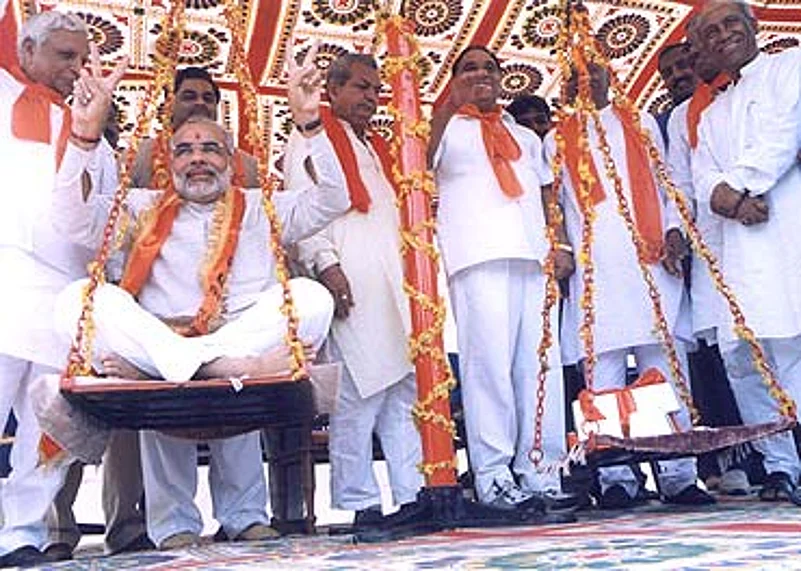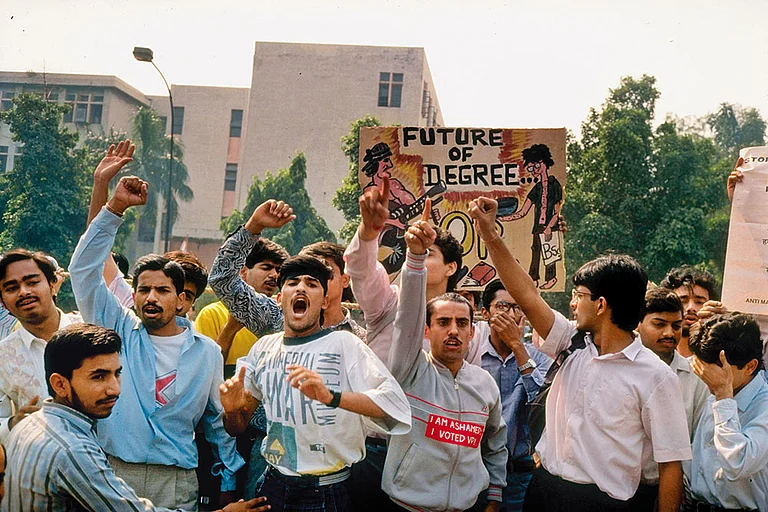'Cry, My Beloved Country' is an expression which comes to mind when we think of some facets of the Indian condition, such as that section of our population which lives on Rs 20 a day; farmers who have committed suicide; the hundreds of families who have lost their kin to the violence all around us; and the trauma inflicted regularly on women, of which we saw ghastly examples in Guwahati only last fortnight. These constitute deep agonies.
But between these deep valleys of anxiety lies another terrain. For all its undramatic nature, even this plain terrain has its own smaller ravines and hollows. One such that comes to mind most persistently is the silent interlocking of entrenched interests.
Great causes can accommodate great compromises. I will refer to three such comings-together. The first is in the domain of the state; the second of society and the third concerns individuals—you and me.
My first example has its locus in something we are rightly proud of and which has earned the world's applause—our elections. The coming-together of interests in our elections is the coming together of low politics and high money.
In the first few years since 1937, elections meant the chance to select, objectively, A over B. Today, it can still mean that. However, it cannot but mean the pitting of A's money resources against those of B. Elections have come to mean, by definition, the infusing of candidature with cash. The weaker the candidate, the stronger the cash.
An election episode of 1937 has been recounted by Lal Bahadur Shastri: "I remember his (Nehru's) visit to the district of Allahabad. It was about 8.30 pm when he finished his speech. As soon as he had done so, he enquired from the local Congressmen whether he could leave. Pat came the reply, 'Yes, sir', after having driven about a furlong, Jawaharlal said that the Congress workers of Mirzapur had no sense of hospitality. 'I said I wanted to go and they agreed to it without even offering me a cup of tea.' Nehru had taken no tea in the afternoon and...he was feeling very hungry. He asked me whether there was any restaurant in the city...I remembered the railway station where some tea could be got. He said, 'Let us go there.' We motored to the railway station and went to the railway restaurant.... After having taken the tea, we were asked to pay the bill. Every one of us searched his pockets and found that none of us carried sufficient money. Between us we could collect about two-and-a-half rupees. Nehru had about a rupee and a quarter, Mrs Purnima Banerjee another rupee and I gave the few annas to complete the full amount required. How awkward would it have been if we had failed to make up the amount among ourselves!"
Another cameo, this time from the elections that followed a decade later, in 1946: the highly respected Congressman of Bombay, Vaikunthlal Mehta, was a candidate. His reputation was such that any individual or corporate house would have considered it a privilege to assist with his campaign. When he was contemplating the contest, his instincts for integrity were strengthened by a letter he received from Gandhiji. "Offer your name as a candidate for the Assembly, on the condition, however, that you will not have to spend a single pie and will not have to go begging for votes," the letter said.
Vaikunthbhai decided to send a postcard to each of his electors and do nothing more. The postcards won him the seat and he became the first finance minister of Bombay state after Independence. No donor could have reminded the finance minister of his debt—for there was no donor and there was no debt.
Both these elections were held in pre-Independence India. Let us come to post-independence India in which C. Rajagopalachari had predicted we will see "the power and tyranny of wealth". Candidacy is regarded by some as an investment. The important consideration for such candidates—mercifully their number is small—is that their candidacy will leave them richer than when they entered it.
In 1957, Tata Iron & Steel Co wanted to change their Memoranda of Association in order to allow the company to make contributions to political parties. The matter went to court. The Bombay High Court allowed the change but with a weighty obiter dictum: "...we think it our duty to draw the attention of Parliament to the great danger inherent in permitting companies to make contributions to the funds of political parties. It is a danger which may grow apace and which may ultimately overwhelm and even throttle democracy in this country."
Twelve years after, in 1969, a ban did get to be imposed on corporate contributions to elections funds. But not even seven years had elapsed after that ban when rethinking started. A bill was introduced in Parliament in 1976 seeking to give companies the power to donate up to 5 per cent of their profits to political parties. Nine years later, Section 293-A came to be recast altogether by the Amendment Act of 1985.
As the law stands at present, a political party may receive any amount by way of contributions under the Companies Act. By way of an independent encouragement for corporate funding, Section 77 of the Representation of the People Act excludes expenditure incurred by political parties from the computation of the Election Commission-prescribed ceiling on a candidate's election expenditure.

There are two consequences of all this: first, candidates backed by political parties and corporate donations enjoy a weightage over independent candidates. Second, and more important, before an election weighs votes on its balance, cash weighs itself on the same scale's trays. Examples can be cited of clear, bonafide and transparent donations by business houses to political parties. Rajagopalachari himself approached industrial houses for open donations to the Swatantra Party. But a board of directors' payment by means of a white cheque to a party is not the only source of funding. There is the Hindi saying, 'Haathi ke paaon mein sab ke paaon' (Many paws fit into an elephant's footprint). Vast sums get flung into an election, both from within and outside of the provisions of the Companies Act. This is where black money mingles with the white, making the whole thing as grey as smog.
Beyond the action of grey money in elections lies the important question: once elected with the help of another's money—be it an individual's or a company's—can the victorious candidate look the donor in the eye and say 'No' when that donor asks for an inappropriate concession? The 'power of wealth' then becomes, to use Rajagopalachari's phrase, a 'tyranny', not only for the losing side but for the winning side as well. The time has come for the laws concerning the funding of elections to be reviewed again. The late Indrajit Gupta had chaired a committee to study it. Another study needs now to be made of the working of Section 293-A of the Companies Act.
The second 'coming-together' of entrenched interests concerns us as a society—the coming-together of society and the world of commerce. Gone are the days when society wanted X commodity or Y service and the market supplied X or Y and that was that. Now, with the tools of 24x7 telecasting, the market intensifies, widens, and deepens. It, in fact, generates the demand and then proceeds to meet it. The salutary restrictions on the advertising of tobacco have targeted a clear commodity directly. This is as it should be. But should we leave untouched commercial endorsements which may not be harmful to the body but are decidedly hurtful to the mind?
Mental and emotional health can be corroded by the steady destruction of self-esteem exactly as pulmonary health can be damaged by the regular coating of one's lungs by smoke. Take the unashamed advertisements of products which are an assault on the fragile minds of women in what is called the 'marriageable age'. The unceasing flaunting of cosmetics with the supposed quality of lightening the complexion would have been aesthetically vulgar if it was not also a matter of serious psycho-sociological concern.

If this 'fair skin' brand had been marketed with that kind of advertisement anywhere in Africa, and South Africa in particular, it would have been booed out of the market. For generations, a bias has worked in India towards a fair complexion. We may have emblazoned the mantra 'without distinctions of caste, creed or colour' and we may have pioneered the world's opposition to apartheid, but the fact remains that we are a notoriously colour-biased society. It is a pity that Article 15 of our Constitution, which lists discriminations on the grounds of religion, race, caste, sex and place of birth, has left out colour.
I would urge the government to step in unambiguously and ban advertisements which refer to a fair skin as connected to 'loveliness'. I would also urge all newspapers that earn an enormous revenue from classified matrimonial advertisements to cease publishing any advertisements of that genre which advert to complexion. Our legislation on dowry is undermined by this crass and opportunistic exploitation for profits of a deep-rooted social malaise. To deepen a woman's insecurity about physical appearance and thereby generate an artificial demand for a cosmetic product is to be complicit in the dowry syndrome. That, in our day and age, is Simply Not Done.
The third kind of strategic coming-together that we witness regularly is competitiveness. While competitiveness in the financial, entrepreneurial or managerial spheres is regarded as a virtue, it works corrosively in human affairs. The net of competition now is so tight that the principle of quid pro quo rules human association, almost as a culture. As individuals we cannot seek something without a concomitant obligation to 'make good' somehow or other.
If the casting couch is the most explicitly physical manifestation of this quid pro quoism, the 'office of profit' issue reflects another, vicarious, end of the same. It has now been appreciated that certain public functionaries must not hold any office of profit co-extensively with their official responsibilities. This is not because of pecuniary benefits which such an office of profit may confer, but because such positions empower the holder with authority. And authority can withhold or confer favours. In other words, such position-holders have the opportunity to oblige and ipso facto become obligated.
There is another feature of individual action where a strategic partnership is forged—that between 'pahunch' (patronage) and positions of prize. 'Putting in a word', 'pull' and 'contact' are phrases that have entered everyday discourse. Professionals like members of the civil services, the diplomatic or the defence services reach important positions in the course of their career. Some of them go on to reach positions of selection or an appointment beyond or after their regular service is over. It is assumed—sometimes not incorrectly—that those few reach their post-service positions through the principle of pahunch and not because their 'pravinata' (skills) is required by the nation. This assumption is grossly unfair to many persons. But the wholesale dismissal of that assumption would be grossly unfair to those who have not reached such positions.
The claims and counter-claims of pahunch and pravinata in our competitive times will, I fear, never be resolved. But of one thing I am sure. To the two 'p's will be added, by some, a third—'prarabdha' (pre-determination). As one who has held such offices through such a process of selection, let me say that doors have opened and potholes closed to let me pass. But the blessing is not unmixed. My late brother Ramchandra Gandhi observed in an interview, "The relationship (to Gandhi) evokes both kindness and unkindness. One is treated with undeserved special respect and affection. And with undeserved special chastisement if one does something insufficiently saintly."
I have received my share of chastisement as well. Over the last few months, I have acquired a pen friend. Unfortunately, the friendship is one-sided, for the writer does not give his name or address. But I would like to thank him for raising a constructive issue: the declaration of assets. At present, those appointed to a constitutional position do not submit a statement of their assets, while those who are elected do.
If I am not following up this comment with a unilateral declaration of assets, it is because a matter like this must await a policy decision by our lawmakers. Individual declarations would lamentably appear 'holier than thou'. George Orwell once described a happily married couple displaying their happiness as 'washing one's clean linen in public'. A union between office incumbency and integrity is like clean linen—eminently desirable. But a superfluous washing of it, done to flaunt one's own brand of detergent, would be eminently deplorable.
Besides, I would not want this suggestion of mine to be seen as some form of gubernatorial humility. As Golda Meir once said to a 'modest' associate: "Don't be so humble-humble; you are not that great."

























